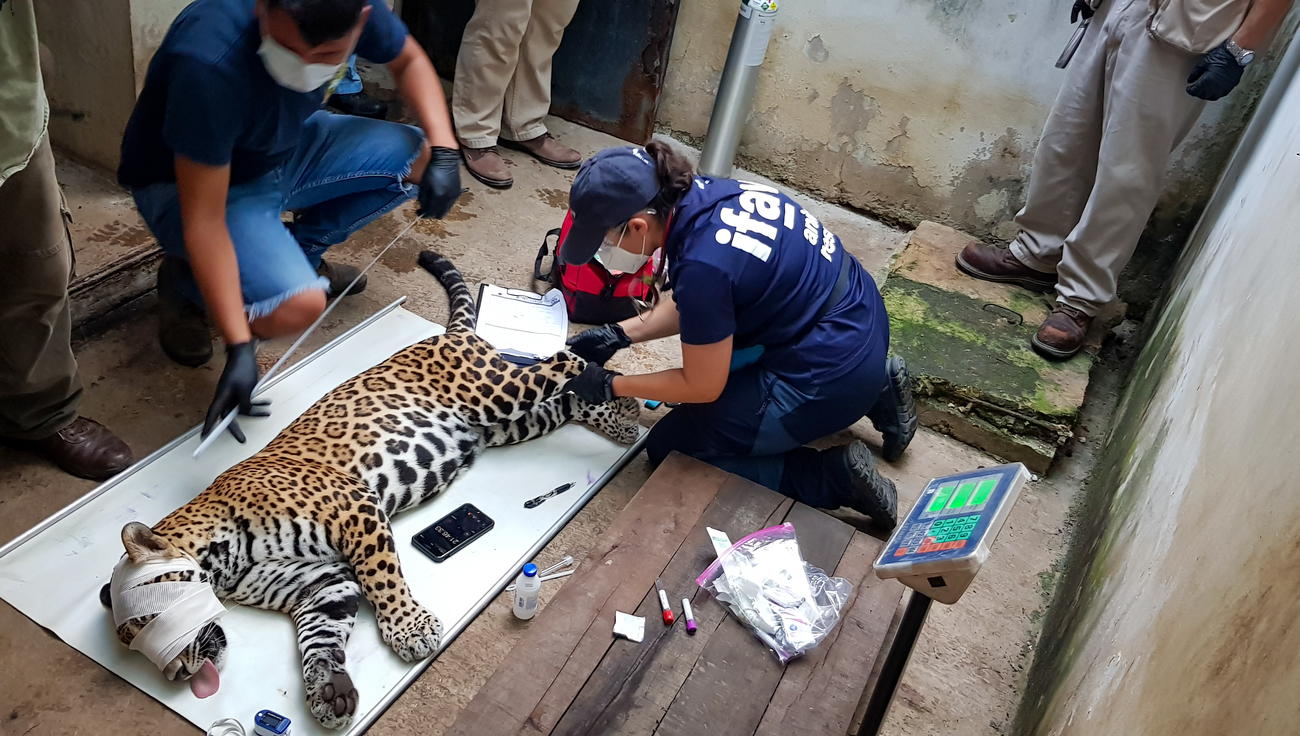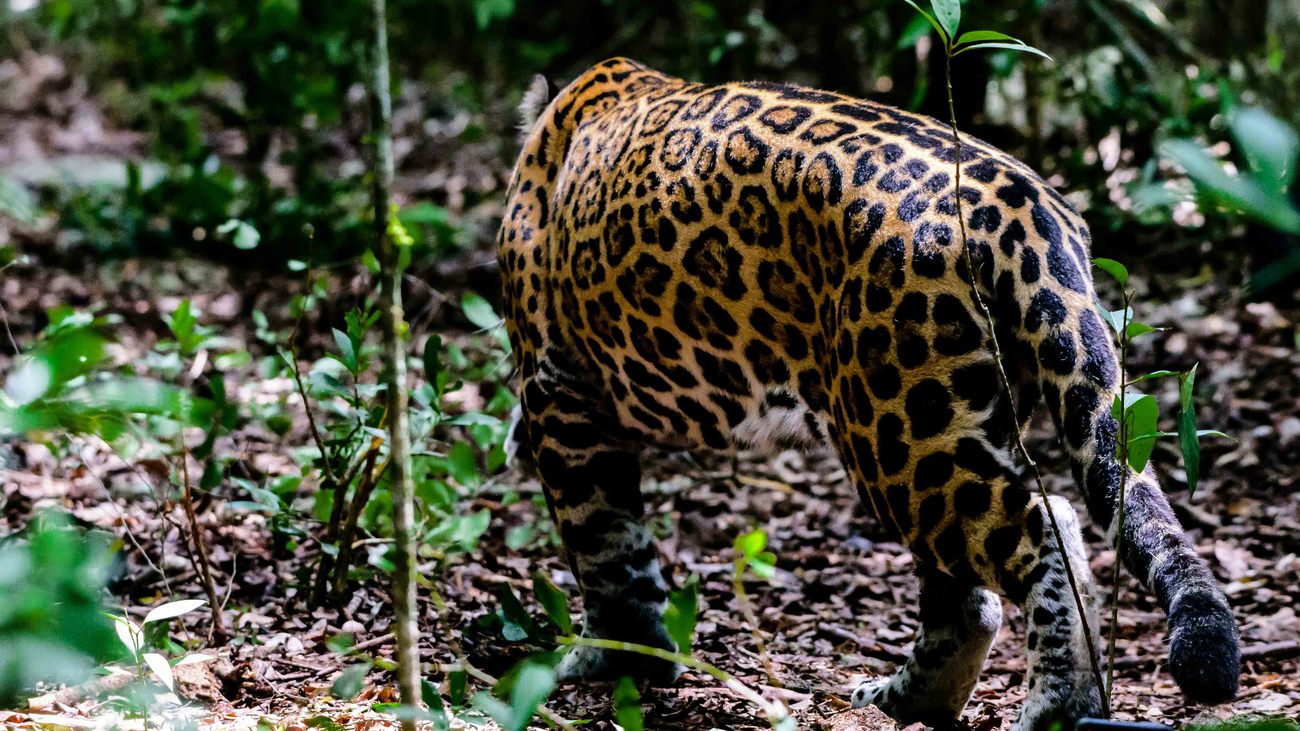Playa del Carmen Community Animals Project - Mexico
Leadership saves animal lives in the streets of Playa del Carmena second chance for Covi: rehabilitating and releasing a jaguar in Mexico
a second chance for Covi: rehabilitating and releasing a jaguar in Mexico

After 100 days of specialized rehabilitation, the day we had all been waiting for was finally here. Covi the jaguar was ready to be released back into the wild!
Our story with Covi starts a few months ago when he was hit by a car while crossing a highway in Alvaro Obregon, Mexico. Luckily, local veterinarian Libertad Fuentes and her partner found him and provided as much emergency care as possible for an injured, unconscious big cat. They put him in a crate and immediately alerted the authorities.
Federal Inspector Noe Ku Chan from PROFEPA (Federal Attorney for Environmental Protection), Roger Braga, Director of the Payo Obispo Zoo, Lucio Cruz from PPA (State of Quintana Roo Attorney for Environmental Protection) and Salvador Julio from IBANQROO (Biodiversity and Natural Protected Areas of the State of Quintana Roo) answered the call for help late on a Friday night. They drove to meet Libertad with the jaguar and transport him to the Payo Obispo Zoo.
Caring for the big cat
Covi arrived at the zoo in the early hours of Saturday morning. He was in the perfect place to receive specialized care, as the zoo is known for rehabilitating injured and seized wild animals that authorities rescue. The team estimated that he was about 1.5 years old. They put him in a small enclosure where they could keep a close eye on him through cameras to avoid human contact. A few days after his rescue, Covi was still very sore and limping. Experts anesthetized him for x-rays and found a fissure in his shoulder bone. Luckily, no surgery was needed and the limping disappeared after a few weeks of much-needed rest. Thanks to our supporters, we were able to help fund x-rays and some personal protection equipment, and provide additional expertise support. Once Covi was walking normally and even jumping, the team moved him to a larger exhibit for a better recovery.
To monitor Covi with the least human interactions possible, the team carefully set up two IFAW camera traps and GoPro cameras from the zoo outside of the enclosure. Because of the COVID-19 pandemic, there was absolute isolation and no zoo visitors allowed, which created even better conditions for Covi’s rehabiliation.
After a full recovery, Covi’s release date was set for Tuesday, September 22nd. I was so excited that I could barely sleep the night before the big day! My protection gear and emergency medical kit was packed and ready to go. I woke up at 5am and drove with my IFAW colleague, Joaquin de la Torre Ponce, to the local zoo to join their team and work hands on to prepare the jaguar for his journey to freedom.
The day of Covi’s release
First thing in the morning, the zoo medical team sedated Covi for handling and I rushed to monitor the anesthesia. Epigmenio Cruz from the Mexican Alliance for the Conservation of Jaguars put a satellite collar on Covi provided by the Alliance. For the next year and a half, the collar will send location signals every two hours so they can track all his movements until the collar self-releases.
We put Covi in a stretcher, carried him into a special IFAW-sponsored wood cage for transportation, and boarded him onto the IFAW Animal Rescue vehicle for transportation. After a long drive, bumper to bumper, lead by PROFEPA with a convoy of several State and Federal official vehicles, we finally arrived to a dirt road that takes you to Siaan Ka’an Biosphere Reserve, the release site. Omar Ortiz, Director of the Reserve, as well as community members of the Xhazil Ejido Vigilance Committee were already waiting for us to continue the journey. It was a long and slow drive through the jungle, dodging spiny branches and shaking off spiders and bugs that fell from the trees. One of the vehicles was stuck in the mud, but skilled hands and a winch solved that issue quickly.
When we finally arrived to the Biosphere Reserve entrance, vehicles were not allowed so we continued the journey by foot. We set teams of six to carry the heavy wood cage with Covi inside and walked the muddy jungle trail through rain and sun. Finally, we reached the core of the beautiful Siaan Ka’an Biosphere Reserve and had arrived at our release site.
The team moved several meters back, the photographers left the cameras rolling, and we did our last check. We were all very quiet. Roger Braga, the Payo Obispo Zoo team leader, pulled the rope that opened the cage. After a few seconds that felt like hours, Covi turned around, slowly stepped out, checked that there was no danger, and started walking towards the jungle without making a single noise. It wasn’t long until he had disappeared into the jungle. Covi’s journey to freedom took us a total of 6 hours, from the sedation at the zoo to the release location!

A moment I’ll never forget
There are no words to describe the joy and happiness on everyone´s faces (which were also covered by masks). When we finished, all the stakeholders were able to share one big win for the conservation of the species. Having worked at the government in the Wildlife division more than 15 years ago, this means a lot to me and I feel very connected with the inspectors and people that work in the government.
We must remember that to succeed in the conservation work, we must work together at all levels of government, rehabilitators, NGOs, and community members. I am very proud to say that this effort did exactly that!
-Erika Flores, IFAW Veterinarian & Project Manager, Programs
Related content
Every problem has a solution, every solution needs support.
The problems we face are urgent, complicated, and resistant to change. Real solutions demand creativity, hard work and involvement from people like you.